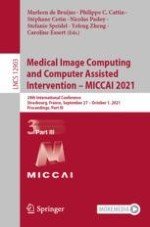2021 | OriginalPaper | Buchkapitel
FedPerl: Semi-supervised Peer Learning for Skin Lesion Classification
verfasst von : Tariq Bdair, Nassir Navab, Shadi Albarqouni
Erschienen in: Medical Image Computing and Computer Assisted Intervention – MICCAI 2021
Aktivieren Sie unsere intelligente Suche, um passende Fachinhalte oder Patente zu finden.
Wählen Sie Textabschnitte aus um mit Künstlicher Intelligenz passenden Patente zu finden. powered by
Markieren Sie Textabschnitte, um KI-gestützt weitere passende Inhalte zu finden. powered by
